|
Play List: 4. Corinne 7. The Mormons 9. Lucy Brandon 10. Storm-Beaten 11. Lady Clare 13. Bachelors 14. Constance 15. Lottie 16. Agnes 17. Alone in London 18. Sophia 19. Fascination 20. The Blue Bells of Scotland 21. Partners 24. Angelina! 25. The Old Home 26. A Man’s Shadow 27. Theodora 29. Clarissa 30. Miss Tomboy 32. Sweet Nancy 33. The English Rose 36. Marmion 37. The Gifted Lady 38. The Trumpet Call 39. Squire Kate 40. The White Rose 42. The Black Domino 44. The Charlatan 45. Dick Sheridan 47. Lady Gladys 48. The Strange Adventures of Miss Brown 49. The Romance of the Shopwalker 52. Two Little Maids from School ___ |
|
ROBERT WILLIAMS BUCHANAN (1841 - 1901) |
|
|
|
|
|
|
|
|
THEATRE REVIEWS 31. The Bride of Love (1890) - continued
The Derby Daily Telegraph (2 June, 1890 - p.3) “The Bride of Love,” so successfully produced at a recent Adelphi matinee, will be transferred next week to the nightly bill of the Lyric Theatre. The talented author, Mr. Robert Buchanan, has, it is stated, received offers from three West End managers to place it in their programmes, but it has been decided that the Lyric is the best suited to the production. Dr. Mackenzie’s beautiful odes, which won such general admiration, will have the advantage of a full orchestra under the direction of Mr. Walter Slaughter, the composer of “Marjorie.” ___
The Stage (6 June, 1890 - p.11) Last week I stated that Robert Buchanan’s Bride of Love would shortly be placed in the evening bill of a theatre. As a matter of fact, it will be staged at the Lyric on Saturday next. Considerable alteration has, I understand, been made in the piece, and a great improvement will be noticed in the introduction of more music than was heard at the matinée performance. Miss Ada Cavendish, Miss Harriett Jay, and Mr. Thalberg will resume their original parts. ___
The Morning Post (9 June, 1890 - p.5) THE CRYSTAL PALACE.—The first performance this season at the Crystal Palace of a grand evening ballet is fixed for Thursday evening, previous to the display of fireworks. Pending the production of the new ballet, which is in active preparation, “A Golden Dream,” so successfully performed during the season of 1889, will be reproduced. To-morrow and Thursday afternoons there will be two special performances at the Crystal Palace of Mr. Robert Buchanan’s new mythological drama (recently produced with marked success at the Adelphi Theatre), entitled “The Bride of Love,” in which Miss Harriett Jay, Miss Ada Cavendish, and Mr. T. B. Thalberg will appear, supported by a powerful company. ___
The Daily News (11 June, 1890 - p.3) LYRIC THEATRE. We so recently dealt with Mr. Robert Buchanan’s “The Bride of Love,” when the play was produced at a matinée at the Adelphi, that little more than a bare announcement is required of its transference to the evening programme at the Lyric Theatre. The parts of Aphrodite, Psyche, and Eros are again entrusted to Miss Ada Cavendish, Miss Harriett Jay, and Mr. Thalberg, and, indeed, the only important change in the cast is the substitution for Mr. Lionel Rignold of Mr. Ernest Hendrie, who is an amusing representative of the comic minor-deity Zephyros. Miss Luna is now entrusted with the dance of Euphrosyne in place of Miss Letty Lind; while Dr. Mackenzie’s two choice odes still add to the interest of the second and last acts. Mr. Buchanan’s piece is preceded by Mr. Alec Nelson’s “By the Sea,” a little piece based upon “Jean Marie.” ___
The Standard (12 June, 1890 - p.3) LYRIC THEATRE. This handsome theatre, hitherto the home of light opera, a form of entertainment regarded as frivolous by serious-minded persons, has been selected for the regular nightly performance of Mr. Robert Buchanan’s poetical drama, The Bride of Love. In welcoming this contribution to a school of dramatic art that has for many years suffered almost total neglect, we pointed out, when the play was produced at an Adelphi matinée, certain defects which marred its force and true poetic beauty. With regard to the performance at the Lyric, it may be said that Miss Ada Cavendish, Mr. Thalberg, and Miss Harriet Jay resume their original characters, and that the two last-named artists already evince more power in their respective parts than they did at the first rendering of the play. Mr. Ernest Hendrie does his best as Zephyros, and so does Miss Luna as Euphrosyne, but the latter is scarcely an acceptable substitute for Miss Letty Lind. Dr. Mackenzie’s beautiful wedding chorus is still effective, and not a few among the audience would rejoice if there were more incidental music of equal worth. ___
The Stage (13 June, 1890 - p.12) THE LYRIC. On Monday evening, June 9, 1890, was produced here (after having been brought out at a matinée performance at the Adelphi, on May 21 last) the poetic play in four acts, by Robert Buchanan, entitled:— The Bride of Love. IMMORTALS. The Goddess Aphrodite ... Miss Ada Cavendish MORTALS. Methonos ... ... ... Mr. Alfred Brydone That the higher reaches of dramatic art are served by a play such as The Bride of Love there can be no doubt. The playhouse finds itself taken out of its own air into the ether beyond, where are the pleasures of the imagination. And they are felt scarcely to be pleasures bodiless, impalpable, only half-evident, as though the gleams of a will o’ the wisp among the shadows of the mind. It is the great charm of The Bride of Love that so much of it, for all the gossamer, the fantasy, the miracle, is made quick to us through the common sorrows and joys. The imagination becomes stimulated through the heart. All the senses are alert, deftly prompted by form, by colour, by sound, by movement; beneath, lying deeper, helping all, dominating all, is the master passion of our human being. That the aim is to show Love not only in human conditions but also sublimated, makes the purpose, if more difficult of achievement, then not less true or less strong. There is still the heart-beat, bringing Eros down to us from his heights, even as it lifts Psyche up to them. Hence, instead of the cold formalism of many efforts in this stage manner, or the unsatisfying abstraction, often the incongruity and sheer preposterousness—instead there is a theme highly imaginative, finely transcendental, suffering a theatric exposition that pleases by outward graces, that takes firm hold by inherent powers. To-night we seek to picture to your gaze Our tale is old as Love, yet ever new, On the same evening was produced the drama in one act, founded on Theuriet’s Jean Marie, by Alec. Nelson, entitled:— By the Sea. Jamie ... ... ... Mr. Leonard Outram This little play, which has already been seen at St. George’s and at Ladbroke Hall, and elsewhere, has been more than once fully noticed in THE STAGE. On the present occasion it is done ample justice to by Mr. Leonard Outram, a manly earnest Jamie—whose voice, however, on Monday had not quite got the right range of the house; by Miss Frances Ivor, a praiseworthy Jeanie, with some especially good moments in the critical place; and by Mr. A. Brydone, a hale auld Robin Gray. ___
The Era (14 June, 1890) THE LYRIC. On Monday Evening, June 9th, the New Poetical Play, IMMORTALS. Goddess Aphrodite ... Miss ADA CAVENDISH MORTALS. Methonos ... ... ... Mr ALFRED BRYDONE “In consequence of its triumphant success on its first production.” With this justifiable boast was Mr Buchanan’s poetic play revived on Monday, and put into the bill for a run at the Lyric Theatre. Its success at the Adelphi matinée was a triumphant one, triumphant beyond expectation, for it is not often that a poetic play, produced on a brilliant day in early summer, arouses the enthusiasm of those who have been tempted from the sunshine to witness it. The play, it will be remembered, is founded on the beautiful Greek legend of “Eros and Psyche,” with treatment which is practically new and original. In speaking of the Adelphi production we remarked that the author in preparing the work had in mind the Gilbertian style of fairy comedy; that he invented a comic god; repented of his work, but lacked courage to destroy it. This was Zephyros, who vulgarised every scene in which he appeared, and supplied the only blots on a play replete with fancy and rich in poetic feeling. The beautiful suggestion of the fourth act—Psyche, Mr Buchanan reminds us, actually passes through the Shadow of Death, and arising thence glorified realises not only the old Greek idea of Apotheosis, but the modern Christian sentiment of the resurrection of the spiritualised body—this suggestion, we insisted, ought not to be spoiled by the comic “wheezes” of a Zephyros recalling the late Mr Buckstone in burlesque, and giving off passages out of harmony with the prevailing tone of the play. It is proverbial, however, that nothing succeeds like success, and success having attended the initial representation of The Bride of Love, we cannot affect to be surprised that the author has been content to leave well alone, and, indeed, it must in fairness be admitted that Zephyros on a second introduction did not appear quite so objectionable as at first, notwithstanding that he indulged in a little excessive pantomime and still talked of tradesmen who in their sleep cried females’ names not belonging to their wives, and of kings in palaces who at night put on slippers to creep and kiss their saucy scullions. These blemishes on Monday night, as before, were pardoned—were, indeed, almost lost sight of in listening to the many sweetly poetical passages in which the play abounds, and in following the course of true love for Eros of poor Psyche, afflicted so terribly through her irrepressible curiosity. A few unimportant changes have been made in the piece since the first representation, the most notable being the rising of Eros from the sea in the second act, instead of appearing suddenly from behind the temple of Aphrodite, to deliver his beloved one chained to the rock. Miss Harriett Jay resumed her original part as Psyche, playing it, if possible, with even more grace and tenderness than at first, and she certainly succeeded in securing for the hapless heroine a full measure of sympathy. The gem of the play is the passage in which Psyche describes to her sisters the birth of her love for Eros, and this Miss Jay delivered with a full appreciation of its beauties; her audience listened with rapt attention and delight. Hyla to Psyche has said, “We thought thee loveless, yea, an icicle, devoted to eternal maidenhood,” and this is how Psyche makes reply— And so I seemed—till, at my lord’s first kiss, Mr Thalberg, too, played his original character, and, more distinct and more impassioned than at the Adelphi, repeated his success, and was admired of all present. Mr Bassett Roe, Mr Leonard Outram, Mr Alfred Brydone, Mr C. M. Hallard, Mr Henry Bayntun, Miss Frances Ivor, Miss Ada Cavendish, and Miss Marie Fraser again appeared, and gave distinction to the parts associated with their names, while “new blood” was introduced in the persons of Mr Ernest Hendrie, Miss Laura Linden, Miss Emmie Bowman, Miss Mary Kingsley, and Miss Luna. Mr Hendrie treated the part of Zephyros with praiseworthy delicacy, and extracted considerable humour from it. Miss Linden was splendidly emphatic as Eridon, and Miss Kingsley as Creusa was a worthy successor to Miss Ada Ferrar. Miss Luna followed Miss Letty Lind as Euphrosyne, but in her incidental dance did not make us forget that charming exponent of the saltatory art. The original music by Dr. Mackenzie and Walter Slaughter was again admired, and one or two supplemental numbers found deserved favour. To-night we seek to picture to your gaze Our tale is old as Love, yet ever new, ___
Lloyd’s Weekly London Newspaper (15 June, 1890 - p.6) LYRIC THEATRE. Having taken so much pains with his poetic play The Bride of Love, it was hardly likely that Mr. Robert Buchanan would rest content with the single performance at a matinée at the Adelphi recently. The elegant theatre in Shaftesbury-avenue being available, he has transferred the piece thither with nearly all the former cast and with increased spectacular effect. The musical element also is extended, and Dr. A. C. Mackenzie’s fine choric odes—the epithalamium and “Love is Lord of all”—as well as Mr. Walter Slaughter’s agreeable incidental strains, receive adequate justice from a band conducted by the last-mentioned composer, and from a strong force of youthful vocalists. The play makes a successful appeal both to eye and to ear, whilst, on the whole, but little fault could on Monday be found with the acting, or with the delivery of Mr. Buchanan’s refined and tuneful verse—of course making allowance for the regrettable circumstance that so few young men on the stage can at the present time speak anything but prose—and by the way, not always that correctly. Miss Harriett Jay, who, as Psyche, now recites a prologue asking for illusion “for such pure fantasy,” acts with grace and infinite tenderness, particularly in the third act, when the Princess is persuaded by her envious sisters to press her lover—Eros himself—to disclose his name, and when answered is stricken blind. No actress who hesitated to throw heart and soul into her work could hope to realise the author’s delicate conception of the character. Mr. Ernest Hendrie represents with some tact the attendant Zephyros, a character that seems to us a mistake as limned by Mr. Buchanan, who, we may be sure, had reasons for his policy. Miss Ada Cavendish is still the Aphrodite, and Mr. T. B. Thalberg remains the Eros. The scenery and tableaux form charming stage pictures. The production was in each of its details cordially approved on Monday. ___
The Referee (15 June, 1890 - p.3) Messrs. G. R. Sims and Robert Buchanan think I ought not to keep the following from Refereaders. I think so too. Sims was asked by Buchanan to write a prologue for “The Bride of Love,” but owing to other work was unable to do so. This week, however, after hearing Miss Jay recite the prologue at the Lyric he sent his friend the following burlesque, which deals not so much with the present at the Lyric as with the future at the Adelphi:— DEAR BUCHANAN,—You asked me to write a prologue—I hope it isn’t too late—and, O! if Miss Jay would but speak it to you as beautifully as she spoke the prologue last night I should, indeed, be proud.—Always yours, PROLOGUE TO “THE BRIDE OF THE ADELPHI.” From Gods of Hellas, Robert, if you can The clouds uplift—the scene grows bright and gay, ___
The Referee (22 June, 1890 - p.3) As might naturally have been expected by everybody—except the late Mr. Vincent Crummles, who could never understand how these things get into the papers—Mr. Robert Buchanan has replied to Mr. Sims’s poem as given by me last week, and somehow or the other, in a way which would also astonish the late Mr. V. C., the copy of verses has found its way to this office. It seems to me very clever, but while there is a reason why we should always give verse written by Sims, there is no special reason why we should give verse written by Buchanan. Anyway, here are a few lines as sample, and readers who desire to know what the rest is about will doubtless get all they require—and more—on application to the author at the theatre which he is now running:— Alas! what passing shadow dims This is the invocation. The rest does not seem to our translator of this sort of thing either pertinent or of much importance until we come to R. B.’s statement that— Down from my Heaven I come with pleasure: Wine not? But let that pass. It is more to the point that the Adelphi will close in about three weeks, and will then give its mind to the reconstruction of its “gridiron” and other necessary alterations and repairs. After which rehearsals will begin in earnest for the production on August 2 of the Sims-Buchanan Irish drama. The American and Canadian rights of this play have already been secured by Messrs. Daniel Frohman, of New York, and R. M. Field, of Boston. The first American production will take place at the Boston Museum on or about October 1 next. The title at present selected for this new Irish play is “The English Rose,” which is all very well in its way; but I wouldn’t mind betting six to four that it is not the one which will be finally adopted. ___
The Theatre (1 July, 1890) “THE BRIDE OF LOVE.” New poetical play in four acts, by ROBERT BUCHANAN. IMMORTALS |
|
|
|
Chorus of Graces and Elementary Spirits. MORTALS |
|
|
|
Attendants, Cupbearers, Soldiers, &c. Save in one character, Mr. Buchanan has turned to excellent account the beautiful legend of Eros and Psyche. It was a hazardous experiment, this endeavour to submit to playgoers, too prone now-a-days to turn everything into ridicule, so ethereal a subject, but by his poetic verse and dramatic treatment, the author commanded the interest and respect of an unusually critical audience. |
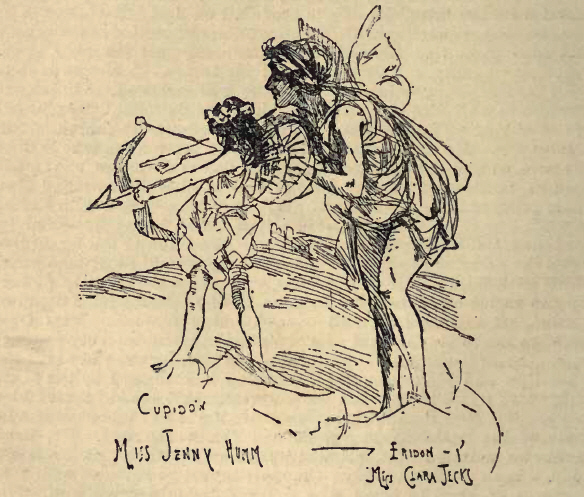 |
|||||||||
|
The legend has been frequently dramatized, notably in ballet form by Moliére, and has been the foundation of burlesque and extravaganza, but Mr. Buchanan’s method is new and original. On the summit of a mountain we behold Eridon and Cupidon, children of Aphrodite, amusing themselves by shooting Love’s arrows among the throng of citizens below, and enjoying the effect their random shafts produce. The Goddess, jealously incensed at the neglect shown her altars in Cyprus and the almost worship bestowed on Psyche, through her oracle proclaims that the daughter of Methonos shall be chained to the Rock of Sacrifice to be devoured by a sea monster. Eros, eldest born of Aphrodite, is beguiled by his henchman, Zephyros, into gazing down the mountain, and beholds Psyche. |
|||||||||
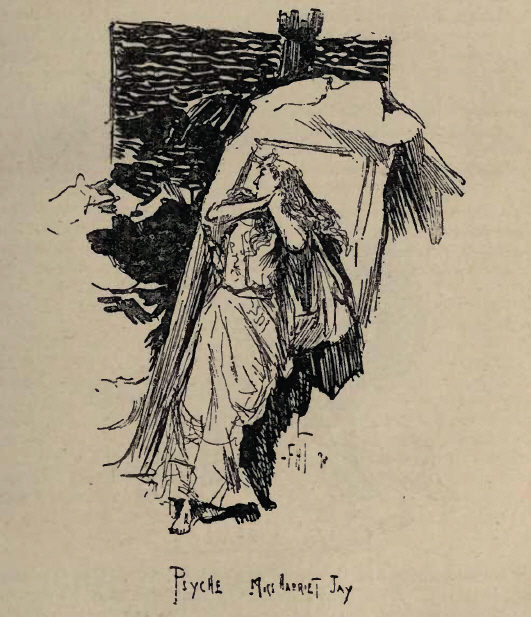 |
|||||||||
|
The god who has implanted love in every human breast, has never yet himself felt its power—his soul is at once inflamed. He rescues Psyche from the rock, and bears her away to the Garden of Love. Unalloyed happiness is theirs for a time, but envy and jealousy destroy it. Psyche’s sisters, Hyla and Creusa, taunt her that she knows not who is her lord. Up to this time she has refrained from asking, blissful in her ignorance, but now she presses Eros to grant her a last request, and he swears by “Styx and Acheron” to comply. She questions him as to who he is. In an agony of grief he is compelled, by his oath, to answer, for by the laws of Olympus it is written that— “Should a god reveal himself Psyche is stricken blind as Eros vanishes, and is lost to her for ever. Aphrodite rejoices in the punishment of her rival, but her maternal love is so great that it conquers her hatred, when she beholds the agony of her son. Immortal, he cannot die, yet the endless future is to be to him one of heart-broken misery; sway as he will the destiny of others, he cannot influence his own loveless life. Zephyros, feigning the loved voice of Eros, entices Psyche to the mountain top where dwell the deities. Sightless, she follows, until once more she finds herself clasped in the embraces of her lover. But that embrace to her is death. Eros prays the gods that she may be restored to him, “Give me back the soul which ye have taken from me.—Say, ye gods, that love shall conquer death.” Aphrodite petitions Zeus that Psyche may be made immortal. Their prayers are granted. Psyche returns to life, this time immortal, with the words “Eros, my love, where art thou? The discordant note that is struck in an otherwise exquisite allegory, is in the drawing of Zephyros, servant to Eros. His character is so specially modern and mundane. And exception may, perhaps, be slightly taken to the mortal and spiteful attributes of the sisters in the Garden of Love—a paradise—when Psyche, through Eros’ power, has given to them Lycas and Atalantos, the men they had long loved, but who had hitherto been insensible to passion for them. The scene in which the several kings sue for Psyche’s hand in Cyprus is powerfully written, and affords scope for good delivery, of which advantage in most cases was taken. In the Garden of Love was introduced a pas seul with cymbals, most gracefully danced by Miss Letty Lind. |
|||||||||
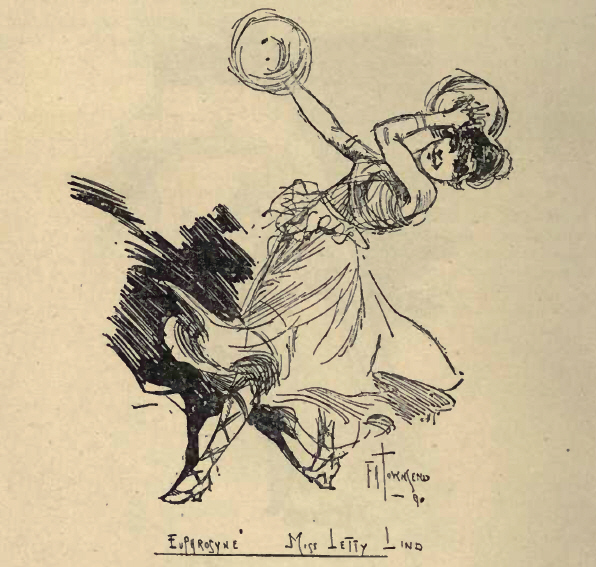 |
|||||||||
|
In her long retirement from the boards, Miss Ada Cavendish has lost none of her dramatic power, and her return to her profession was cordially welcomed. Miss Harriett Jay, for whom the part of Psyche has been written, after the first few lines delivered the text with sympathetic grace and true poetic feeling. Mr. T. B. Thalberg commenced weakly, hurrying his utterance in a lamentable manner. This was evidently from extreme nervousness, for he gradually improved, and in his last scenes left little to be desired. Mr. Lionel Rignold is not altogether to blame that he made of Zephyros a cockney attendant on his master. Mr. Brydone, Mr. Outram, and Mr. Roe did thorough justice to the lines entrusted to them. |
|||||||||
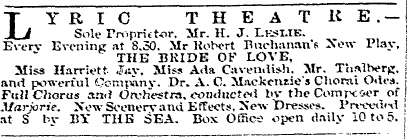 |
|||||||||
|
[Advert for The Bride of Love from The Stage (4 July, 1890 - p.8).]
Ally Sloper’s Half-Holiday (12 July, 1890 - p.6) |
|||||||||
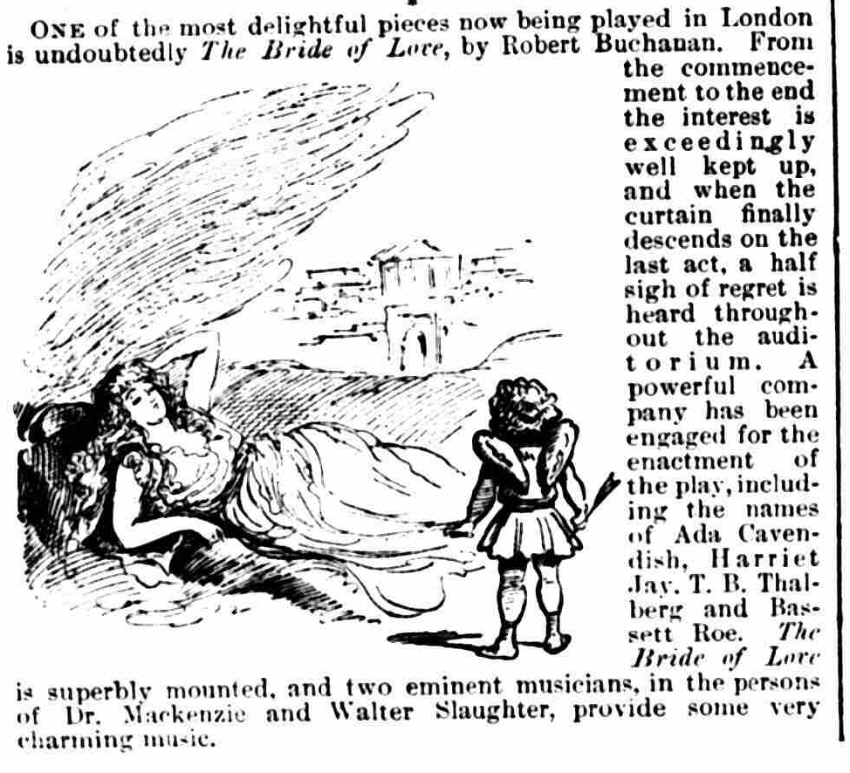 |
|
The Daily Telegraph (26 June, 1899 - p.7) |
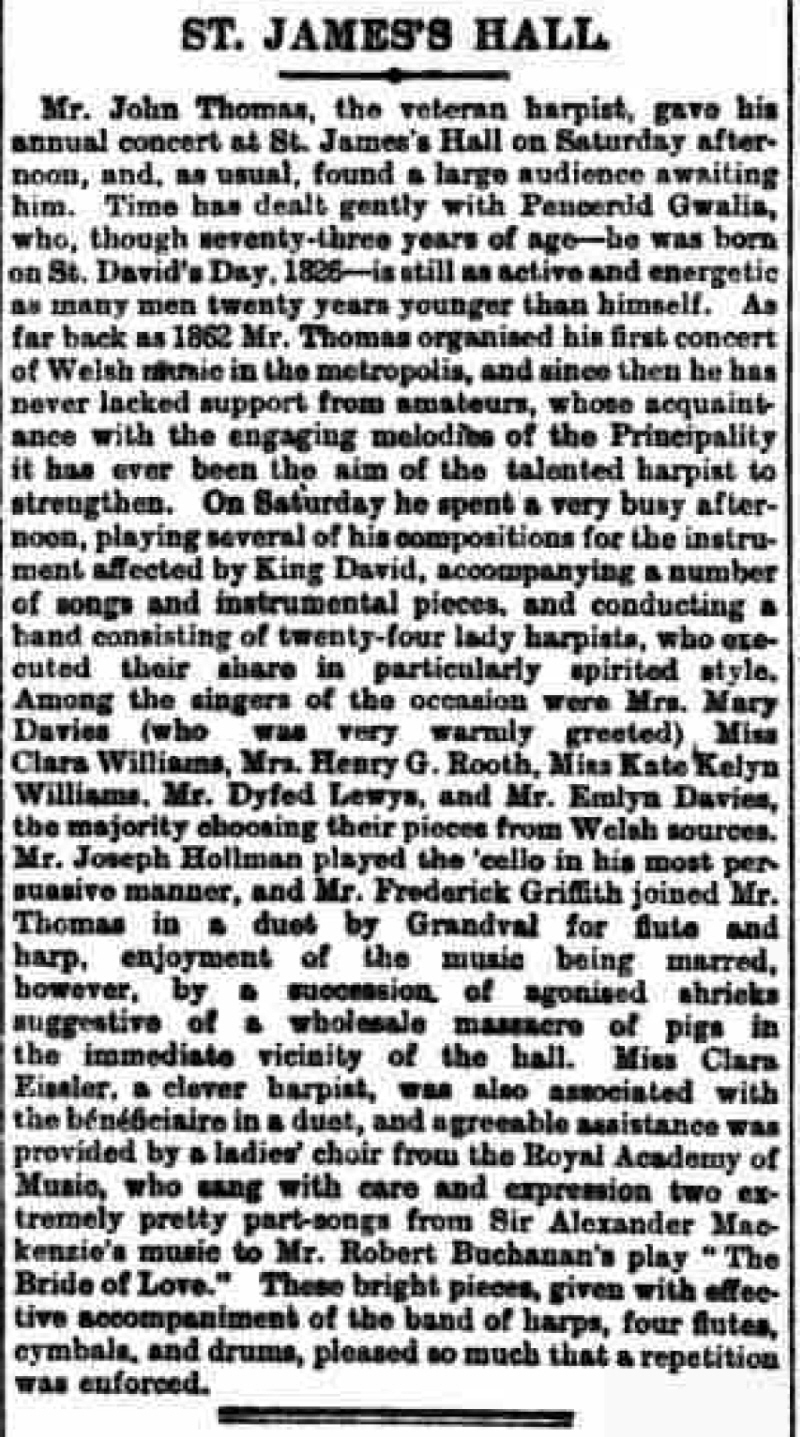 |
|
Miss Letty Lind - personification of the poetry of motion _____
Next: Sweet Nancy (1890) Back to the Bibliography or the Plays or Harriett Jay Theatre Reviews
|
|
|
|
|
|
|